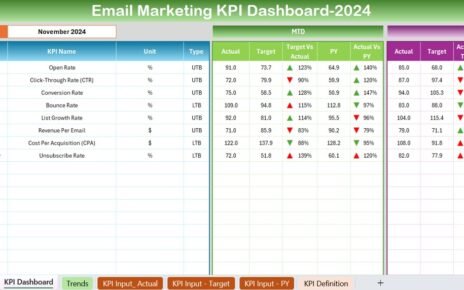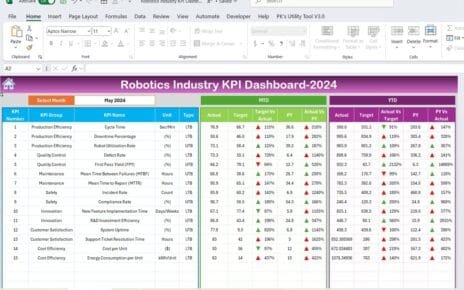Managing a martial arts studio involves more than just teaching martial arts; it requires effective studio management, which can be greatly enhanced by using a Key Performance Indicator (KPI) dashboard in Excel. This article delves into the essential features and uses of a Martial Arts Studio KPI Dashboard, designed to streamline the monitoring and enhancement of studio performance.
Click to buy Martial Arts Studio KPI Dashboard in Excel
Understanding the Martial Arts Studio KPI Dashboard
The Martial Arts Studio KPI Dashboard is an indispensable tool for studio owners and managers. It provides a comprehensive view of critical metrics that influence the success of the studio, enabling you to make informed decisions quickly. Here’s how each component of the dashboard plays a vital role:
Home Sheet: Your Navigation Center
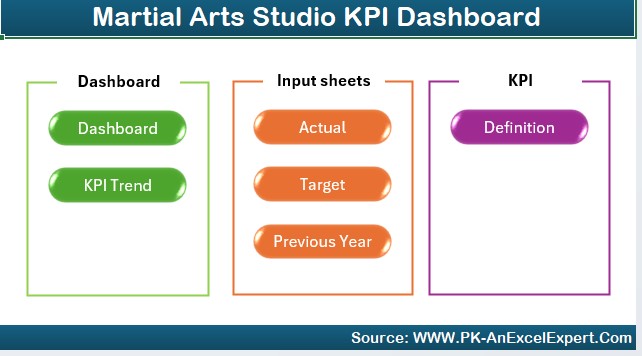
Purpose: Acts as the central hub of the dashboard, featuring six buttons that provide quick access to other specific sheets.
- Benefits: Enhances user experience with simplified navigation, allowing for efficient data access and dashboard management.
Click to buy Martial Arts Studio KPI Dashboard in Excel
Dashboard Sheet Tab: The Heart of Analytics
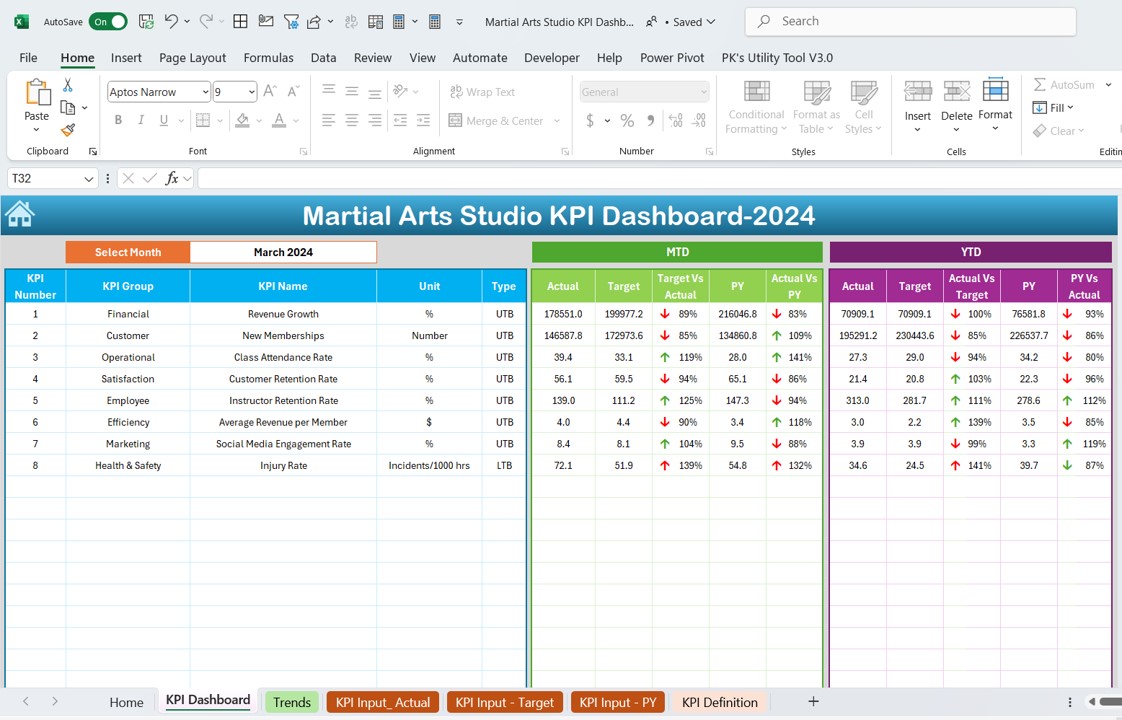
- Functionality: Displays all critical KPIs. Users can select a month from the drop-down on range D3 to view data for that specific period.
Features:
- Comparative analysis with MTD and YTD figures against targets and previous year’s data.
- Visual cues like conditional formatting arrows indicate performance trends.
- Advantages: Quick monthly updates provide fresh insights, enabling responsive strategic adjustments.
Click to buy Martial Arts Studio KPI Dashboard in Excel
KPI Trend Sheet Tab: Visualizing Progress
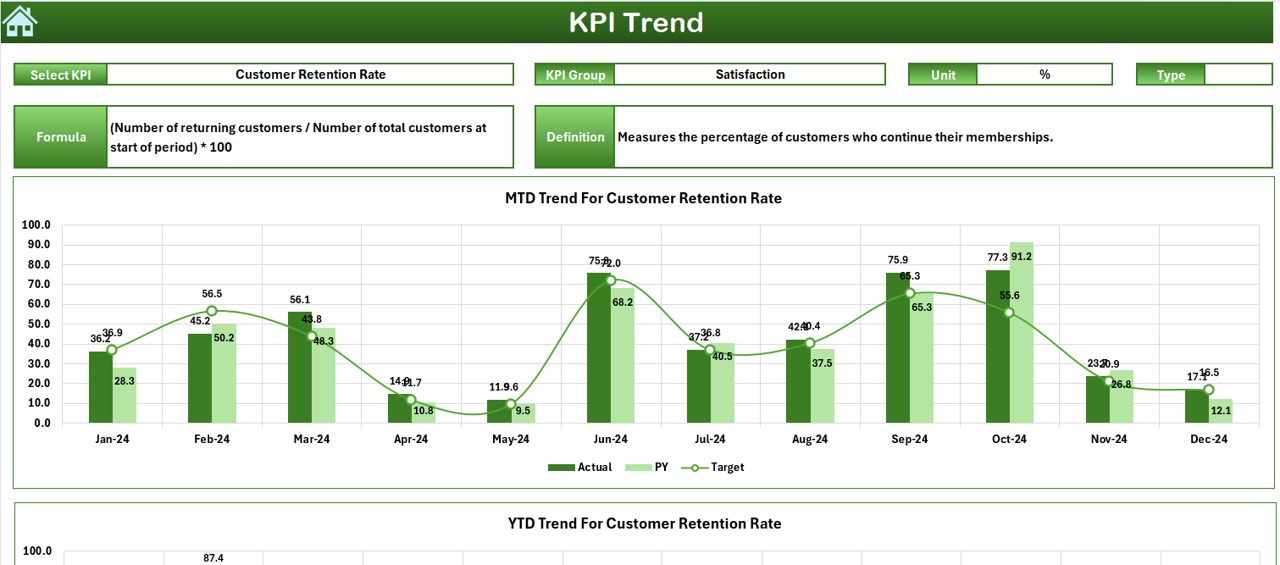
- Overview: Select a KPI from the drop-down on range C3 to display its metrics, including type, unit, and formula.
- Key Visuals: MTD and YTD trend charts for Actuals, Targets, and Previous Year figures.
- Utility: Helps track long-term performance trends, facilitating better goal-setting and KPI reviews.
Click to buy Martial Arts Studio KPI Dashboard in Excel
Actual Numbers Input Sheet: Data Entry Point

- Usage: Enter actual performance data for both YTD and MTD.
- Flexibility: Adjust the months for data input to reflect the studio’s operational year.
- Importance: Accurate data entry ensures reliable performance tracking.
Target Sheet Tab: Setting Goals

- Purpose: Allows for the entry of monthly and yearly target figures for each KPI.
- Function: Assists in performance evaluation against set benchmarks.
Click to buy Martial Arts Studio KPI Dashboard in Excel
Previous Year Number Sheet Tab: Historical Comparison

- Role: Input previous year’s data for a comparative year-over-year analysis.
- Value: Historical data provides context to current year performance, highlighting trends and anomalies.
KPI Definition Sheet Tab: Clarity and Documentation

- Content: Contains detailed definitions, formulas, and classifications of each KPI.
- Benefit: Ensures consistency in understanding and analyzing KPIs across the management team.
Advantages of the Martial Arts Studio KPI Dashboard
Utilizing a KPI dashboard brings several benefits:
- Enhanced Decision-Making: With data readily available, decisions are quicker and more data-driven.
- Improved Performance Monitoring: Real-time tracking of critical metrics ensures that goals are consistently met.
- Strategic Planning Support: Historical data trends aid in formulating effective future strategies.
Click to buy Martial Arts Studio KPI Dashboard in Excel
Best Practices for the Martial Arts Studio KPI Dashboard
To maximize the effectiveness of your KPI dashboard, consider the following best practices:
- Regular Updates: Keep the data fresh and reflective of the most current operational status.
- Comprehensive Training: Ensure all users are well-versed in navigating and utilizing the dashboard.
- Data Accuracy: Maintain rigorous standards for data entry to ensure reliability.
- Review and Adjust: Periodically review the dashboard’s effectiveness and make adjustments as necessary.
Conclusion
The Martial Arts Studio KPI Dashboard in Excel is more than just a tracking tool; it’s an integral part of strategic management for any martial arts studio. By effectively using this dashboard, you can ensure that your studio not only meets but exceeds its operational and financial goals.
Frequently Asked Questions with Answers
Q. How often should the KPI dashboard be updated?
Update the dashboard at least monthly to ensure the most accurate and actionable insights.
Q. Can the dashboard be customized for different martial arts styles?
Yes, the dashboard is fully customizable to cater to specific martial arts styles and their unique KPIs.
Q. What is the most critical KPI for a martial arts studio?
While it varies, student retention rates are often considered a critical KPI, as they directly impact revenue and growth stability.
Click to buy Martial Arts Studio KPI Dashboard in Excel
Visit our YouTube channel to learn step-by-step video tutorials
View this post on Instagram
Click to buy Martial Arts Studio KPI Dashboard in Excel


